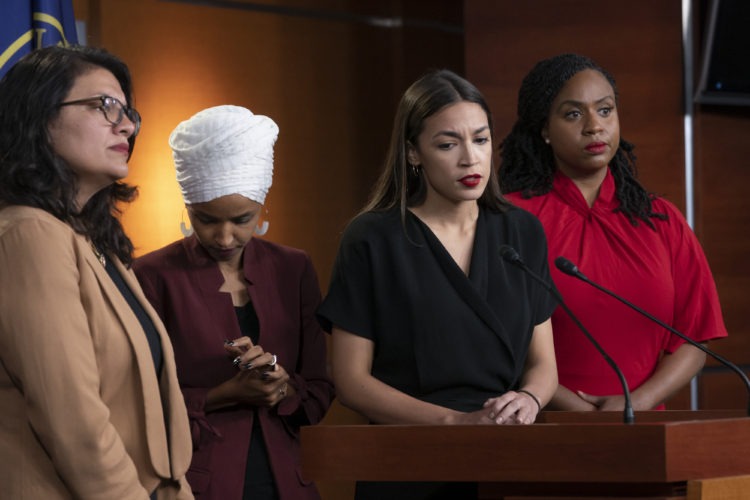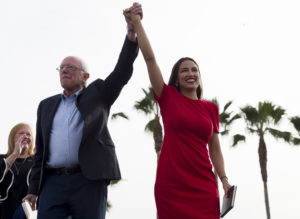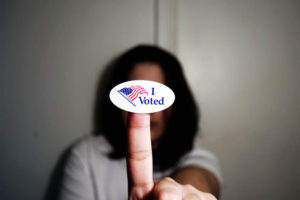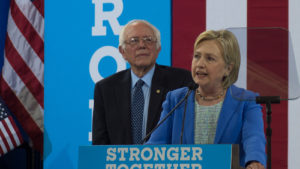Democrats Must Give Up ‘Center Is Better’ Myth
Reporter Ryan Grim delves into money power versus people power, and why the party needs more of the latter if it hopes to win elections. From left, Reps. Rashida Tlaib, D-Mich., Ilhan Omar, D-Minn., Alexandria Ocasio-Cortez, D-N.Y., and Ayanna Pressley, D-Mass., at a news conference in July. (J. Scott Applewhite/AP)
From left, Reps. Rashida Tlaib, D-Mich., Ilhan Omar, D-Minn., Alexandria Ocasio-Cortez, D-N.Y., and Ayanna Pressley, D-Mass., at a news conference in July. (J. Scott Applewhite/AP)
On the night Democrats won control of the House of Representatives in the 2018 midterm elections, the soon-to-be House Speaker Nancy Pelosi said those who oppose the Trump administration and the Republican Party “must try [to find] common ground” with them and stressed the importance of “a bipartisan marketplace of ideas that makes our democracy strong.”
Her words were an unwelcome shock for voters who had just elected freshmen lawmakers like Reps. Alexandria Ocasio-Cortez, D-N.Y., Ilhan Omar, D-Minn., and Rashida Tlaib, D-Mich. They and others ran on progressive, ambitious goals like a Green New Deal and single-payer health insurance that are far from bipartisan and took umbrage at big-money influence even in the Democratic Party. It also surprised some centrist Democratic voters who were looking forward to more oversight of the Trump administration and pushback against his policies.
It wasn’t the first time progressives clashed with establishment Democrats over the value of compromise in policymaking, or the first time those not aided by wealthy donors confronted those who are, The Intercept reporter Ryan Grim explains in his new book, “We’ve Got People: From Jesse Jackson to Alexandria Ocasio-Cortez, the End of Big Money and the Rise of a Movement” (Strong Arm Press, 2019).
Grim, in his years of covering the Democratic Party for outlets like Politico, HuffPost and The Intercept, where he is now the D.C. bureau chief, has chronicled multiple instances of such situations, from Howard Dean’s attempt to win the Democratic presidential nomination in 2004, Rahm Emanuel’s efforts to elect Democrats to the House as the chair of the Democratic Congressional Campaign Committee, and the rise of online advocacy and fundraising groups like MoveOn.org that popularized the kinds of small-dollar donations that propelled Bernie Sanders’ 2016 campaign.
In the book, Grim goes back even further, looking at the links between Ocasio-Cortez’s 2018 congressional run and Jesse Jackson’s 1988 presidential campaign, the erosion of the New Deal Coalition and restructuring of alliances in the Democratic Party after labor unions lost power, and the rise of more conservative policies on health care and criminal justice reform during the Clinton years.
Grim talked to Truthdig’s Ilana Novick by phone about money in politics, the current myths powering the Democratic Party, the lessons learned from Jackson and what it means to be electable.
The conversation has been condensed and edited for clarity.
Ilana Novick: Your book starts with Jackson’s presidential campaigns in the 1980s, particularly in 1988, and connects them to Ocasio-Cortez’s win in 2018. When and how did you first see the connection between the two politicians?
Ryan Grim: You know, the Jesse Jackson campaign, I was only 6 when he first ran, so it wasn’t something I paid attention to, but I always knew that Sanders had endorsed him, and I knew he [Sanders] was one of the only people, he and Paul Wellstone [a Minnesota senator who died in a plane crash in 2002], these are the only two white elected officials to endorse him [Jackson]. So I figured there must’ve been something interesting going on there. But, as I’d gone back and read about it, I was surprised to find that [Jackson’s campaign] had been as successful as it was, because today, if it’s talked about at all, [it’s seen] as just a quixotic kind of messaging campaign, when really it was a fundamental challenge to the structure of the party back then.
Right after Ocasio-Cortez won, I realized that people finally cared about this wing of the Democratic Party, finally cared about the insurgency and the struggle between the establishment wing and the left wing of the party. Now, because I’d been writing about it for more than 10 years, I knew that that had been lacking for a long time. It’s much easier to get traffic for stories about Tea Party shenanigans, or later, Donald Trump, or anything else. But writing about the Congressional Progressive Caucus was not a way to generate clicks.
IN: Speaking of messaging and policy, it seems like Jackson, more so than many politicians today, was able to connect economic suffering to racism, not seeing the two as mutually exclusive problems to be pitted against each other. I wonder why you think he was so effective in doing that, and what people in the Democratic Party could learn from that today?
RG: He was more sophisticated about how he did it then than are 99% of Democrats in how they do it today—and they’ve had 30 years to think about it. I think part of it, you have to remember that he was Martin Luther King Jr.’s right-hand man. King himself was one of the best at making those connections through the March for Jobs and Justice through the Poor People’s Campaign, and I think part of it is because they were closer to the time when it was much more explicit. [President Lyndon B. Johnson] understood it very well, what was his famous quote? “If you can convince a white man he’s better than a black man, he’ll empty his pockets for you,” something like that. And so, people like Martin Luther King and Jesse Jackson watched how economic anxiety was explicitly used to undercut the civil rights movement.
They just very instinctively recognized the links between those two, because they watched it being done in reverse. And, you’re right, if somebody who has a casual understanding of Jesse Jackson would think about his ’84 and ’88 campaigns, they would say, “Oh well, this was probably an extension of the civil rights movement, and demanding a voice for African Americans at the Democratic table.” And, in fact, it was a legacy of the civil rights movement, but a legacy of the kind of Jobs and Justice, Poor People’s Campaign of the civil rights movement. And, he really led with economic violence as the thing he was running against.
The farm crisis at the time, and the hollowing out of manufacturing really played into it, because you’re watching it happen in front of you. Today, we look at Ohio and Michigan and Wisconsin, and you can see the consequences of that hollowing out of the manufacturing industry. At the time, we were seeing it happening in real time.
IN: Your book details how, when the Democratic Party and its consultants decided which candidates they should run to help address that hollowing out, among other issues, they seem to choose those that are economically centrist, if not entirely pro-corporations, and are afraid to mention race. Why?
RG: Yeah, it’s this hangover from the ’80s where a certain element of the Democratic establishment convinced themselves that white backlash to the civil rights movement and to the counterculture is the reason they were pushed out of power. And that they just run as far away as they possibly can from those issues. And, you know, I think part of it also would be that if they’re leaning into it, then they would actually have to start to deliver on a policy basis. To do that, they might have to advocate for the universal programs that business interests would be against. So, it just becomes easier to just avoid it altogether, just bask in the corporate cash.
IN: You also push back against a lot of ideas about certain politicians, like Jimmy Carter and Walter Mondale, and even Howard Dean, about somehow being too liberal, and you’re kind of arguing that perhaps their policies weren’t necessarily that liberal at all, and I’m wondering why you think those ideas started in the first place, and why they’ve been so long-lasting in terms of the way that Democrats choose candidates to run in all kinds of elections?
RG: I think it’s because actual centrists recognize that if back-to-back losses by Carter and Mondale, and then Dukakis in ’88, are cast as failures of centrists and centrism, then the solution, strategically, would be, well, “Let’s go with the left-wing candidate.” There was a progressive primary challenger to Carter, Ted Kennedy, there was, like we said, we had Jesse Jackson and others in ’84 who ran to the left of Mondale, but the establishment just kind of organized around him immediately.
And then, in 1988, of course, there were progressives, including Jesse Jackson, who was the finalist against Dukakis. So, if the centrists keep winning the primaries, but then they lose the general elections, then you don’t want the conclusion to be that progressives ought to be nominated and take a different tack, then you just have to say, “Well, the problem is actually these liberal elements of these candidates, and actually Carter was too liberal, or Mondale was too liberal, or Dukakis from Massachusetts, he’s too liberal.” You have to kind of pretend that it was your opponents who failed rather than you, so that you can keep running your centrists until you can get somebody in. And, in ’92, they finally got [President Bill] Clinton in.
IN: Your mention of Clinton also reminds me of another person that the book spends quite a bit of time on, which was Rahm Emanuel, who was a key staffer for both Clinton and Obama. There’s an ongoing idea that his leadership of the DCCC was particularly helpful for Democrats in the 2006 midterm election. He advocated spending a lot of money on consultants, making expensive television ads and not spending more on field organizing. I’m curious why, even if these tactics didn’t help Democrats win, the party kept using them?
RG: Part of this has to do with the rise of television as the primary means of mass communication. You see the explosion of corporate influence and big money on politics rising at the same time as the influence of television. In 1980, Republicans had very much exploited television and 30-second television ads much faster and more effectively than Democrats had, and that was a big part of why they did so well in the Senate. And so, Rahm Emanuel—his first campaign was when he was 20 in 1980—he saw this. And he saw that Democrats needed to be competitive in that arena, which is true. A lot of these senators had pretty illustrious careers and high approval ratings, and they just couldn’t stand up to the weight of this barrage of television ads.
And one of the reasons that small dollars, and people, have a chance of making a comeback at this point is that the power of television is declining. It’s still big—if you spend several million dollars on television in a congressional district in a week, you’re going to move the needle. That’s the disturbing reality people need to understand, and you see it playing out in interesting ways.
IN: Any recent examples?
RG: Wisconsin, for instance. Just this spring, Democrats were on the brink of electing a [state] Supreme Court justice in a key election, and dark money and Republican groups came in in the last week or two and dumped millions of dollars in television ads, smashing the Democratic judicial candidate and elevating the Republican one.
The strategy and the tactics line up. You know, if you empower people at the grassroots, you’re empowering people that are the most excited about parties, you’re probably going to get the most progressive people. And people like Rahm are embarrassed by people like that and threatened by them, because they have different politics than the bankers or the other corporate interests who they kind of link their stake to.
IN: I also wanted to ask you about when and how Democrats decided that the only way to win a swing district was to run a centrist, Army veteran business owner who was tough on crime, or something like that? When did that become the only version of what is considered electable?
RG: This is a debate that has been happening in American politics since the very first congressional election. When the Republican Party was first formed in the 1850s, [party members]debated whether … a full-on abolitionist [could] win in a district that had people who opposed the extension of slavery but didn’t advocate its full abolition. They debated, “Well, if you run on abolition, you’ll draw people out who are excited about fighting for a moral good. So, you’ll inspire the base.” And others would say, “Well, you’re going to turn off the people who are kind of OK on some elements of slavery.”
We’ve been having this debate for 150, 200 years, and it never gets resolved, partly because a lot of it is district-dependent and candidate-dependent. [Also, it’s] because we don’t do … proportional parliamentary elections where people choose a party because they like its particular platform. Instead, we have these geographic districts where it really matters if the person went to college in the district, were they born in the district, were their parents from the district? Are they really an Akron person if they’re running in Akron, Ohio, or whatever. So much of that matters before you even get to what their policy positions are.
It’s just kind of an endless cycle until you get people to combine all the different elements in a single candidate. Like, Ocasio-Cortez would be a good example of somebody who is from the district, fits the demographic, she talked about this, but then has strongly progressive politics as well. And so, you can endlessly debate, was it her politics, was it who she is, was it where she comes from, was it her talent as a campaigner? It’s like, well, it was all of them in different degrees.
IN: One scenario that comes up multiple times in the book involves the role of consultants and the politicians that are close to them advising other politicians not to push too hard for certain policies that are seen as too extreme. I’m thinking in particular of the 2009 battle over whether to include a public option in the Affordable Care Act, and how much power could have been taken away from insurance companies but wasn’t. And then politicians who voted for the compromise version still often lost to conservative Tea Partiers in the 2010 midterms who accused them of being socialists. The Democrats lost control of Congress anyway, but the people giving them advice still have power. Why?
RG: I think there are two key lessons to take from 2010. One is that you’ve got to go as big as you possibly can when you can, because the window isn’t open for very long, and if you do something that is ultimately popular, even if you lose power, it’s going to be difficult for the other party to repeal. So, it’s like almost all of the Affordable Care Act was. Once people were getting the benefit, they didn’t want to lose it. So, you need to get the benefit to people faster.
Democrats did a completely horrible job on the foreclosure crisis, and they did not turn the economy around anywhere near fast enough. And they did not deploy their kind of grassroots army that they built up throughout 2008 to try to pressure Washington to do a much bigger economic stimulus. You can check the numbers, but on Election Day 2010, unemployment was something like 10% and by then Democrats were getting the blame for it, even though the crash happened under Bush.
A third kind of related lesson is that you’re going to lose power. You shouldn’t structure a strategy around the notion that you’re going to be a permanent everlasting majority; that shouldn’t be the goal. The goal should be to take power, put into place policies that make people’s lives better, and policies that can endure if you lose power—if and when you lose power. Then it goes to the question of, what’s the purpose of the political party, is it to help a group of people take and maintain power, or is it to actually improve the lives of people the party represents?
IN: Can you think of any examples, either in 2018, or even before, when a politician either won or came close to winning, as a Democrat, and they stuck to their progressive policy positions in the face of establishment backlash?
RG: One example I mention in the book is Barack Obama. Democratic voters then were told: “This guy can’t win. His name’s Barack Hussein Obama, the country is not ready for a black president.” And they went with it, and he won. But, in 2018, [Rep.] Katie Porter [of California’s Orange County] I think is a pretty good example. She ran in a Republican-held district, and she did not trim her sails at all, and she’s gotten here, and she beat an establishment-backed primary candidate, and then she won in the general election. Then you had a bunch of candidates who kind of low-key endorsed things like Medicare for All, and went on to win despite the arguments from Washington that it would doom your campaign.
Even people who are talked about now as new-Dems or centrists, like Colin Allred in Dallas, he ran on Medicare for All. And he won his primary and then he won the general election, and he since has been less than an unapologetic … progressive, but it shows you can win those campaigns. And Kara Eastman came very close to winning in Omaha when the DCCC failed her. She was completely doomed, but she came awfully close. Then on the Senate side, people like John Tester, he’s now won three times in Montana, kind of bucking the consultant wisdom each time, in 2006 when he first won he ran as an anti-war candidate, when Rahm was telling people not to oppose the war.
IN: You write about how, even as the Iraq War was getting underway, a bright spot was the rise of online fundraising. Organizers for the Howard Dean campaign and organizations like MoveOn.org started to capitalize on the internet as a tool for fundraising. What groups do you think have really done this well, and what can learn from 2003 and 2004 going into 2020?
RG: I think trying to build capacity from one election to the next, and linking your social welfare organizations and your electoral organizations is really important. There’s this split where people talk about inside and outside, or electoral and non-electoral, and I understand that there are tax implications that need to be grappled with to do it. But there’s got to be more of an effort in organizing regular people in ways that can get them quickly involved in campaigns both in donating and volunteering, and then turning out to vote. That’s going to be increasingly important as the total collapse of an agreed-upon media ecosystem really starts to take effect in elections. You need your party to be its own organism that can rally against that kind of stuff.
And, you have to do it pretty quickly and take a lot of the profit motive out of the consultancies, which profit by keeping these campaigns siloed, and these projects siloed. Like, if the party had a massive database it was constantly building that could be used by organizations and candidates, then consultants would be able to cash in a lot less. So that’s something they need to grapple with, what they’re going to do, just going to have to, every year, start re-creating the wheel.
IN: Are there any 2020 candidates you think are learning from the mistakes you write about?
RG: I think both Sanders and Warren are trying it, and so if one of them wins the nomination, they’ll be putting it to the test. But then, there’ll be the risk that the center [is afraid of running on more progressive policies]. … It’s sad the establishment doesn’t want to see that test given a fair shot and would rather see it go down.
Your support matters…
Independent journalism is under threat and overshadowed by heavily funded mainstream media.
You can help level the playing field. Become a member.
Your tax-deductible contribution keeps us digging beneath the headlines to give you thought-provoking, investigative reporting and analysis that unearths what's really happening- without compromise.
Give today to support our courageous, independent journalists.






You need to be a supporter to comment.
There are currently no responses to this article.
Be the first to respond.